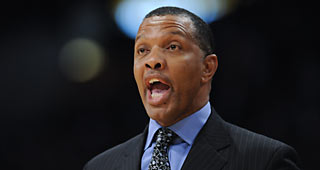For lack of a better term, the New Orleans Pelicans season' was a mess. It isn't an exaggeration to say everyone got hurt, with only Dante Cunningham and Alonzo Gee appearing in more than 70 games. Every player who was expected to be part of the rotation at the beginning of the season missed 15 or more games and several missed 30-plus. Having that many injuries makes winning an almost impossible task.
All of that said, the Pelicans did themselves no favors. Anthony Davis has missed at least 14 games in each of his first four seasons. He’s obviously an all-world talent when healthy, but you have to have a contingency plan in place when your best player misses as much time as Davis does. Ryan Anderson was that contingency to some extent, but he’s only had one healthy season in eight years.
Adding to Davis and Anderson, the wings and guards aren’t any bastion of health either. Jrue Holiday spent the season having his minutes managed, even not starting for most of the year despite no other good options at point guard. Holiday’s backcourt mate, Eric Gordon, predictably missed most of the season with multiple maladies. Tyreke Evans, after two relatively injury-free years, missed the majority of the year as well.
Compounding the Pelicans' injury situation is an extreme lack of depth. This is due to their frontline players having big dollar contracts, a lack of recent first round draft picks, and poor use of available exceptions. New Orleans invested a large amount of money and years in both Omer Asik and Alexis Ajinca to man the center position; a curious decision when Anthony Davis should be playing some minutes there each game. They also handed a guaranteed contract to Kendrick Perkins as well, despite no obvious need for him, nor him being a good fit for the offensive style Alvin Gentry wanted to run. A lot of cap space was tied up in the aforementioned Holiday, Gordon and Evans as well.
It is hard to assess Gentry’s impact this year with not getting to implement his system due to the revolving door of available players. Barring some wholesale organizational changes, Gentry should be given another season to see what he can do to develop a contender around Anthony Davis.
This summer New Orleans needs to re-assess their current strategy of roster building. Ryan Anderson and Eric Gordon come off the books and neither is expected to return to the Pelicans. It is likely Gordon’s large cap hold will be renounced to free up space. Anderson’s more reasonable cap hold, and Bird rights, will be kept until he makes a decision on where to play, just in case there is interest in a return. The other unrestricted free agents (Norris Cole, Jordan Hamilton and Kendrick Perkins) are also likely to be renounced to free up as much space as possible. The Pelicans can go either way on Qualifying Offers for James Ennis and Tim Frazier. Both have proven they belong on an NBA roster as third string options at the very least, but New Orleans shouldn’t let that keep them from making bigger moves.
Of the partial/non-guaranteed players, Bryce Dejean-Jones has the best chance of sticking around. In limited games before getting hurt himself, he showed the ability to be a backup wing at the end of the rotation. And his contract is also very cheap, which is key for a team that is tight against the cap. Luke Babbitt has a small guaranteed amount and he’s been decent offensively when given the chance to play. Given the Pelicans can save about $1 million in cap space by waiving him, you can see it going either way. The same is true of Toney Douglas. Both Babbitt and Douglas have guarantee dates that are after the first wave of free agency will be complete, so New Orleans will likely keep them both and only waive them if the space created is needed.
New Orleans' cap situation is tricky for several reasons. First is that they are carrying over $31 million for Asik, Evans and Holiday. All have injury and/or production issues. When almost a third of your cap is tied up in three players, those players have to be locks to produce and you have to nail the surrounding roster spots. That leads us to the second challenge. Alexis Ajinca is on the books for $4.7 million, Dante Cunningham for almost $3 million and Quincy Pondexter for $3.6 million. That is money that could definitely be better spent elsewhere, but is wasted on injured or ineffective players.
The final piece that makes the Pelicans cap sheet hard to predict is the uncertainty about how much Anthony Davis will be paid on his extension. Davis signed a full five-year, maximum extension under the Fifth-Year 30% Max Criteria, generally known as the Derrick Rose Rule. Normally, players coming off Rookie Scale contracts are eligible for an extension of up to 25% of the cap (it is actually based off BRI, but cap is commonly used). To be eligible for the 30% criteria a player has to meet one of the following three criteria:
- Named to All-NBA First, Second or Third team at least twice
- Voted as an All-Star Game starter at least twice
- Named MVP at least once
Davis did not meet the last two criteria, leaving only the first in doubt. The approximate difference in salary for next season is $5 million dollars. Given that Davis has missed significant time, it wouldn’t be surprising to see him not be voted as an All-NBA selection. Despite wanting to reward their franchise player, this would be a welcome development for a team with limited flexibility under the cap.
Given the cap restrictions, the Pelicans' options for external improvement are limited. It is paramount that they nail their draft pick this year. Currently slated to be the sixth pick, New Orleans should be able to get a contributor. Buddy Hield seems an almost ideal option for a team that needs to add shooting around Davis, Evans and Holiday. With two second round picks, the Pelicans also need to add players who can at least have a shot at cracking the rotation.
In free agency, despite holes up and down the roster, it is unlikely the Pelicans have the ability to add a major piece. They’d be wise to take a path similar to Portland, and try to identify undervalued players and offer them creatively structured contracts. Logical targets could be players like Gerald Henderson, O.J. Mayo, Solomon Hill, and Jerryd Bayless. More expensive options that also fit nicely are Jared Dudley, Kent Bazemore, Evan Turner, and Kris Humphries. It will also be important for New Orleans to find a competent backup PG that can allow them to manage Jrue Holiday and cover for him when he’s out. Options within the Pelicans price range could include Brandon Jennings or D.J. Augustin. Or if the team wanted to extend an offer to a RFA, players like Tyler Johnson, Langston Galloway or Marcelo Huertas would be terrific backups.
New Orleans needs to take a careful, measured approach to this offseason. The first step is to hope for better health, but to plan as if that won’t happen. Getting serviceable backups in behind Davis, Evans and Holiday will make it that much easier to compete if any of them should go down. Using their limited resources in a smart manner should allow the Pelicans to build a deeper team that fits Alvin Gentry’s desired style around Davis. Overextending questionable contracts, as has been done in the past, could set the team back for years going forward.
The Pelicans have one of the single best assets in the game in Anthony Davis. It has been written before about Davis carrying the load alone. One year of poor health and bad luck can be excused, as it happens to every team at some point. But several years where the team doesn’t give him necessary help could force Davis to look elsewhere to become a title contender and that would be the ultimate setback for New Orleans.
Offseason Details
Guaranteed Contracts (7): Alexis Ajinca, Omer Asik, Dante Cunningham, Anthony Davis, Tyreke Evans, Jrue Holiday, Quincy Pondexter
Partial/Non-Guaranteed Contracts (3): Luke Babbitt, Bryce Dejean-Jones, Toney Douglas
Potential Free Agents (8): Ryan Anderson (UFA), Norris Cole (UFA), James Ennis (RFA), Tim Frazier (RFA), Alonzo Gee (PO – UFA), Eric Gordon (UFA), Jordan Hamilton (UFA), Kendrick Perkins (UFA)
“Dead” Money on Cap (0): None
First Round Draft Picks (as of 4/7/16): #6
Maximum Cap Space: $25,431,197 (minus approximately $5 million if Anthony Davis makes All-NBA)
Projected Cap Space: $7,870,782 (minus approximately $5 million if Anthony Davis makes All-NBA)



